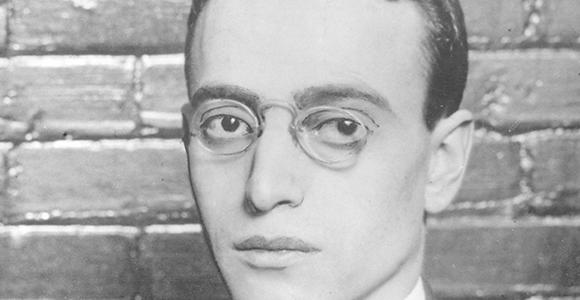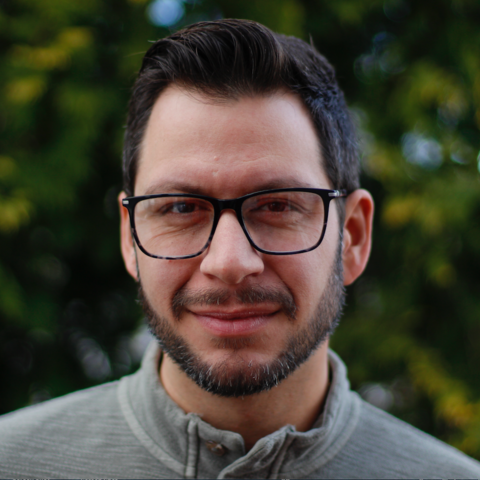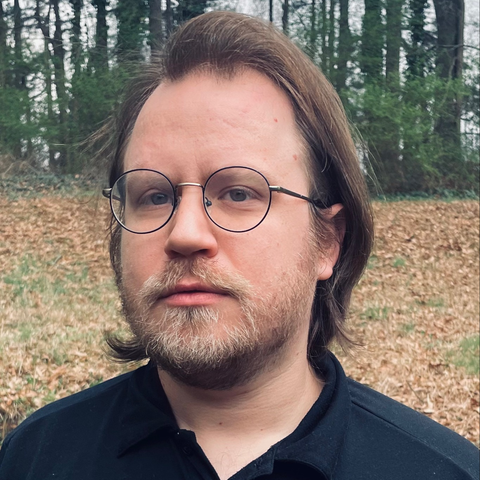
Section Branding
Header Content
Georgia Today: State PD increases training requirements; Savannah fountain tribute; Author interview
Primary Content
LISTEN: On the Monday, June 17 edition of Georgia Today: Georgia police officers will now need more training become certified; the city of Savannah unveils a new monument to a woman who helped beautify the city; and a new novel is based on a real act of violence in Georgia more than a century ago.

Peter Biello: Welcome to the Georgia Today podcast from GPB News. Today is Monday, June 17. I'm Peter Biello. On today's episode, Georgia police officers will now need more training to become certified. The city of Savannah unveils new monument to a woman who helped beautify the city. And a new novel is based on a real act of violence in Georgia that occurred more than a century ago. These stories and more are coming up on this edition of Georgia Today.
Story 1:
Peter Biello: New Georgia police officers will have to undergo nearly double the amount of training to become a certified officer. The state's Police Officer Standards and Training Council last week voted to increase the number of required training hours from 408 to about 800. Georgia had been among the states with the fewest required hours of training. The council's deputy director, Chris Harvey, says Georgia is now among the states that requires the most.
Chris Harvey: Things like driving, things like firearms, things like use of force, things like defensive tactics. It's time to put more emphasis where I think it needs to be.
Peter Biello: It's Georgia's first update in police officer training hours and nearly two decades. And it comes amid nationwide scrutiny over policing that followed high-profile deaths and protests, including several in Atlanta.
Story 2:
Peter Biello: Savannah has unveiled a new fountain dedicated to a woman who was instrumental to beautification efforts in the Hostess City of the South. GPB's Benjamin Payne reports.
Benjamin Payne: "Savannah's beauty is our duty." That was the motto of the late Mary Robinson Myrick. She was a driving force behind Georgia's first fragrance garden for the blind, which still stands today at Forsyth Park. About a mile south at Kavanaugh Park, dozens of Savannahians came together on a hot and humid June afternoon for an unusual kind of countdown led by Mayor Van Johnson.
Van Johnson: Three. Two. One. Let there be water!
Benjamin Payne: This new 10-foot-tall cast iron fountain flows in honor of Myrick, close to where she lived in Savannah's Ardsley Park neighborhood. Aptly named "The Garden Keeper", the fountain features a sculpture of a woman in robes representing Flora, the goddess of flowers. Savannah alderman Nick Palumbo represents Ardsley Park and City Council and spoke at the commemoration ceremony.
Nick Palumbo: I'm sure that the neighborhood's founders, the Lattimores, which their original residence overlooks this very park, would be absolutely floored that their neighborhood creation, over a century later, would be so beloved and cherished by this community.
Benjamin Payne: Fundraising for the fountain was spearheaded by the Ardsley Park Chatham Crescent Garden Club, which Mary Myrick herself founded just over 50 years ago. For GPB News, I'm Benjamin Payne at Kavanaugh Park in Savannah.
Story 3:
Peter Biello: Voters across Georgia are heading to the polls tomorrow for the primary election runoff. Sarah Kallis has more on what to expect.
Sarah Kallis: Georgia voters living in U.S. Congressional District 14, in Northwest Georgia will get to choose if Democrat Clarence Bullock or Sean Harris will face off against incumbent Republican Marjorie Taylor Greene in November. Voters in West Georgia's District 3 will pick between two Republicans, former state Senate Majority Leader Mike Duggan and former Trump adviser Brian Jack. The winner will compete against Democrat Moore Keller in November to fill the seat of retiring Republican U.S. Rep. Drew Ferguson. Both districts lean heavily Republican, and in southwest Georgia's second district, Republicans Chuck Hand and A. Wayne Johnson will compete for a spot on the November ballot against incumbent Democrat Sanford Bishop, who is favored to win. Four state House districts will also hold a primary runoff. Polls are open from 7 a.m. to 7 p.m. For GPB News, I'm Sarah Kallis.
Story 4:
Peter Biello: The sheriff in Savannah's Chatham County is hospitalized and in critical condition. The office of Sheriff John Wilcher gave no further details on his medical status in a statement yesterday, and asked residents to respect his family's privacy. Wilcher won a special election in 2016 to replace the previous sheriff, Al Saint Lawrence, who died in office. He was reelected in 2016 and 2020. The 79-year-old Republican faces Democrat Richard Coleman in the general election in November.

Story 5:
Peter Biello: Albany has a new $6 million general aviation terminal at Southwest Georgia Regional Airport. Local, state and federal officials celebrated the project's completion at a ribbon-cutting ceremony today. The new terminal, and a new $9 million hangar along with it, replace aging facilities serving private airplane traffic in the region. The terminal and hangar were paid for by a combination of local, state and federal funding, including more than $1 million in COVID-19 relief.
Story 6:
Peter Biello: The first brewpub in Savannah, has closed its doors just two months after celebrating its 25th anniversary. Craft beer enthusiasts packed Moon River Brewing Company last night in its last hours of operation. The company's owner, John Pinkerton, gave no reason for the abrupt closure, but its location in the city's tourism-oriented historic district has faced commercial pressure from high-end hotel and residential projects. Moon River opened in 1998, with Pinkerton later serving as the founding president of the Georgia Craft Brewers Association.
Story 7:
Peter Biello: An icon of the state's poultry industry has died. Abit Massey led the Georgia Poultry Federation from 1960 until 2009. As the top spokesman for the state's nationally leading poultry industry, he became a renowned lobbyist at the state capitol. In 2011, he told the University of Georgia he didn't think lobbyist was a bad word.
Abit Massey: It's a matter of — of providing the right information at the right time to the right people who can make the decisions. And in fact, I tell people everybody's a lobbyist in some way, you know.
Peter Biello: Earlier this month, four Georgia governors paid tribute to him in his hometown of Gainesville. His official obituary says he passed away on Friday. Published reports say he died following a battle with cancer.

Story 8:
Peter Biello: In 1915, an Atlanta man named Leo Frank was murdered by a mob who believed he was responsible for the murder of a woman named Mary Phagan. Antisemitism was at the root of the mob's fury. A new novel set in Atlanta at the time of the lynching and its aftermath, focuses on five adolescent girls who are obsessed with Frank. It's called The Curators, and its author, Maggie Nye, joins me now.
Maggie Nye: Hi, thanks, Peter. It's great to be here.
Peter Biello: You based your novel on the true story of Leo Frank. And while the novel doesn't go through each detail, you do make some important details known to your readers. What facets of the Leo Frank story did you really want your readers to know about, so that they could fully understand what your main characters are obsessed with?
Maggie Nye: So in 1913, a factory worker at the National Pencil Factory named Mary Phagan — who was one month shy of 14, so she was a 13-year-old laborer — was murdered in the basement of the National Pencil Factory. In the sort of days and weeks following her murder, there were various suspects that the state and the police department investigated. And the biggest names that sort of emerged in that case were, her Northern, Jewish, superintendent Leo Frank, and also a Black janitor named Jim Connelly. Connelly ended up being the state's sort of star witness. Her death was also complicated by what was a probable sexual assault. So the kind of combination of a young, white, sort of virginally imagined laborer in this kind of newly industrializing South stirred up a whole bunch of anxiety in especially white men. And there was just this kind of media frenzy focused on both Jim Connelly's Blackness and Leo Frank's Jewishness. Eventually, Frank was convicted of Mary Phagan's murder, and he was sentenced to death by hanging. His sentence was commuted by Gov. Slaten at sort of the 11th hour two days before he was sentenced to to be hanged. And he was taken to a Milledgeville prison farm.
Peter Biello: The reasons for the commutation are up for debate. But the mob was angry about the commutation, and they took what they saw as justice into their own hands. Hanging him in the name of defending Mary Phagan's quote-unquote "honor."
Maggie Nye: Yeah. And her honor is — honor as a sort of euphemism for for virginity and sort of white Southern womanhood and purity is sort of, of utmost importance to her story. I'm actually very interested in Mary Phagan and and sort of her inscrutability because of the way she's been mythologized, as a, as a figure of white Southern virginity. Even her headstone talks about how she was sort of a martyr and died defending her, quote unquote, "honor."
Peter Biello: And what's fascinating in your book is that the group of five, adolescent girls, 13, 14 years old, they are obsessed with Leo and what the newspapers say about Leo. They don't spend a whole lot of time thinking about Mary Phagan, even though you might imagine that they would identify with Mary more easily given their closeness in age. Why do you think they're so obsessed with Leo specifically?
Maggie Nye: I think that Leo is maybe a more appropriate avenue in the way that they're imagining it for this sort of nascent desire that they have. They do actually spend time thinking about Mary Phagan's position as a working woman. They have this sort of like naive understanding or maybe fantasy that a — a working girl has access to this whole adult sexual world. So I think it's a way for them to imagine themselves into a sexual life that is a more appropriate kind of avenue for their desires.
Peter Biello: The girls in this book do something magical: They create a golem. One of your characters. Anna Wolf, really spends a lot of time interacting with the golem when it comes to life. She keeps the golem in an attic closet. Tell me about the golem's role in the story.
Maggie Nye: So he's not — he's not a traditional golem. He doesn't — I mean, he sort of has protective capacities, but more than that, he is the kind of product of their obsession and fantasy. So they — they construct this golem, with the idea that he will look like Leo Frank, that they will produce a sort of Leo Frank that can be in communication with them. And that through doing this, they will have access to this absolute truth — and this is especially Anna's fascination — that is denied to them, that they will know the true story.
Peter Biello: The stories Anna had heard about the golem in folklore was that they eat, they grow, they become independent almost by themselves. And then they do kind of what you would wanted them to do, almost magically. And she finds that she's kind of unprepared to deal with what is essentially like a tiny little monster made out of dirt, who can't really do a whole lot.
Maggie Nye: Yes, they all have great hopes for this golem, you know, that he will sort of be the ticket to their — their ascendancy into knowledge, into understanding, into perhaps sexuality. But he's really — he's really quite limited. He can do things like, say the word Nabisco because he eats a Nabisco wafer sort of cookie. Anna, I think, sees the potential for him to be something more. She really does believe that somewhere in the core of him, there is kind of capital-T Truth. There is absolute knowledge, that she can inhabit and sort of do the right thing. Because by the time we get to this point in the story, they've done a lot of the wrong thing.
Peter Biello: The story certainly shifts when the golem appears. And for me as a reader, my my attention was focused on, "Oh no, they have created something that they don't fully understand what is going to happen with this thing." And I I'd be remiss if I gave it away in this interview, but it's — it's a fascinating part of the story, and I appreciate you writing it.
Maggie Nye: Thank you so much.
Peter Biello: Well, Maggie Nye, author of The Curators, thank you so much for coming in to the studio and speaking with me. I appreciate it.
Maggie Nye: Thank you for having me here today.

Story 9:
Peter Biello: In sports, Atlanta United is transferring star forward Giorgos Giakoumakis. The team announced his move to Mexican side Cruz Azul yesterday. The two teams reportedly had been in talks for weeks. Atlanta United isn't disclosing terms of the deal, but multiple reports say it was for $10 million. Giakoumakis has been instrumental in the Five Stripes' offense since he joined the club for the 2023 season, starting 32 of 41 of his MLS regular season matches and recording 24 goals and seven assists. And in baseball, the Braves face the Tigers this evening for the first of a three-game series at Truist Park. The Braves lost last night to the Tampa Bay rays. Rookie pitcher Hurston Waldrep gave up four hits, four walks and seven runs over 3 2/3 innings. Waldrep's 13 earned runs allowed are the most charged to a Braves pitcher over their first two career appearances. Waldrep has been one of several relatively inexperienced hurlers they've tried in the rotation, and none have performed anywhere near what we're seeing from the veterans. To give you an idea: The quartet of Max Freed, Reynaldo Lopez, Charlie Morton and Chris Sale have combined for a 23 and 10 record and the Braves' record overall, 38 and 31. We can't assume Spencer Strider, had he not injured his elbow, would have turned all those losses into wins. But Braves fans nonetheless are well within their rights to miss him on the mound. On the mound tonight against the Tigers: Max Freed.
Peter Biello: And that is it for this edition of Georgia Today. If you want to learn more about any of these stories, visit our website GPB.org/news. And if you haven't subscribed to this podcast, you might be missing out. So do it now. Subscribe and we'll pop up in your podcast feed tomorrow afternoon with all the latest news from Georgia. And if you've got feedback or a story idea we should know about, you should contact us. The best way to do that is by email. You can email GeorgiaToday@GPB.org. I'm Peter Biello. Thanks so much for listening. We'll see you tomorrow.
---
For more on these stories and more, go to GPB.org/news



